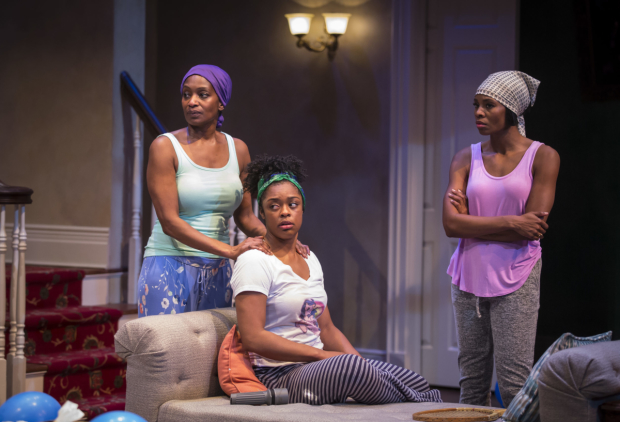Past and Present Collide in Lookinglgass Theatre Company's Plantation!

(© Liz Lauren)
The Wright family is healthy, wealthy, and white. They own a cotton business and a sprawling Texas estate, both of which have been in the family for generations. When matriarch Lillian (Janet Ulrich Brooks) realizes, suddenly, that her family’s prosperity was built on the backs of slaves, she decides to take reparations into her own hands. Lookingglass Theatre Company's latest comedy, Plantation!, written by Kevin Douglas and directed by David Schwimmer, takes a look at race relations between women in America, for better and for worse.
Lillian invites three young women from Chicago — she has determined that they are direct descendants of great-great-granduncle George and his slave Sarah — down to Texas to stay for the weekend. London (Lily Mojekwu), Sydney (Ericka Ratcliff), and Madison (Tamberla Perry) arrive with no idea what’s in store for them. Lillian’s adult daughters (Louise Lamson, Linsey Page Morton, and Grace Smith) are equally clueless, but as their mother’s plan becomes clear, the Dixie sisters' true colors show.
The estate at the center of all of this trouble comes courtesy of scenic designer Courtney O’Neill. The expansive set, a drawing room with a grand staircase, calls to mind the many, many plays that came before this one about an old family set on keeping their old family home no matter what. This time, the family’s privilege is laid bare and their right to the land is thrown into question. It’s a great premise, but its execution, unfortunately, is lacking.
It’s hard to consider the foibles of human nature or the horrors of human history if half of the characters involved just don’t seem human. When the white Wright sisters step out of line, it comes in two flavors: either well-intentioned ignorance or mustache-twirling treachery. The ringleader, eldest sister Kimberly, serves up every "wicked stepsister" trope in the book without a single redeeming quality. Lamson is certainly funny as Kimberly, but there’s no edge-of-your-seat question of how far she’ll go — there’s no place but the bottom for this straight-up villain.
Their mother Lillian, on the other hand, is a newly woke angel, blessed with an unerringly generous spirit and a backbone of wrought iron. Brooks shines in the role, playing up the beats of every theatrical matriarch of a noble family, tempered with a generationally appropriate enthusiasm for Ancestry.com and Facebook. But in a different play, Lillian would be a great, complex character. In this one, she’s obligated to be a saint.
The black Wright sisters from Chicago are given more room to breathe than their southern counterparts. Even as fish out of water, they are immediately relatable. Perry’s Madison is particularly lively, stealing the show several times over with her lively antics. Ratcliff and Mojekwu, too, produce empathetic, three-dimensional performances that throw the flat white Wrights into deeper contrast. Perhaps the underwriting of the white characters is a deliberate choice, but if so, it is undermined by giving the white Wrights equal stage time. Then there’s the problematic inclusion of Diana (Hannah Gomez), the family’s Latina housekeeper. She’s more of a walking plot device than a character: by turns the voice of reason, a coconspirator, an Abe Lincoln impersonator, a notary, and whatever else the plot requires, with no consistency.
That’s not to say Plantation! is short on laughs. There are eight very funny women in the cast, and when they get on the same rhythm, it’s uproarious. Director David Schwimmer lines up the pins for some farcical physical comedy, and Perry and Ratcliff in particular knock them down with panache. But the comedy is too restrained to be a true farce, and the politics are too tidy to say anything meaningful. Though race is at the center of nearly every scene, it is discussed only via platitudes or cringing misunderstandings. "Is this like Get Out?" wonders Kimberly when the sisters are initially presented with the family estate. Alas, it isn’t.










